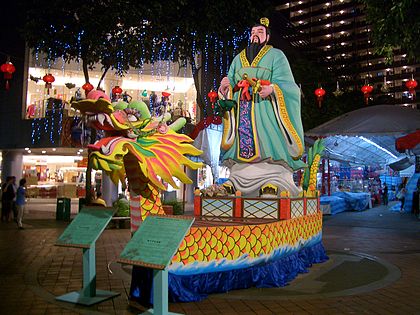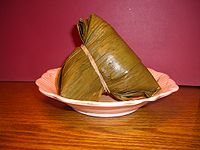- Qu Yuan
-
Qu Yuan (屈原) 
A later artist's impression of Qu Yuan.Born 329 BCE
State of Chu, in what is now Hubei, ChinaDied 299 BCE
The Miluo RiverOccupation Poet, government minister Qu Yuan Chinese name Chinese 屈原 Transcriptions Mandarin - Hanyu Pinyin Qū Yuán Min - Hokkien POJ Kut Nguan Cantonese (Yue) - Jyutping Wat1 Jyun4 Japanese name Kanji 屈原 Transcriptions - Romaji Kutsu Gen Qu Yuan (Chinese: 屈原; pinyin: Qū Yuán; Wade–Giles: Ch'ü Yüan) (329 BCE – 299 BCE)[1] was a Chinese poet who lived during the Warring States Period in ancient China. He is famous for his contributions to the poetry collection known as the Chu-ci (also known as Songs of the South or Songs of Chu). The Chuci together with the Shi Jing are the two great collections of ancient Chinese verse.
Historical details about Qu Yuan's life are few, and his authorship of many Chu-ci poems have been questioned at length.[2] However, he is widely accepted to have written Li Sao, the most well-known of the Chu-ci poems, and possibly several others in the collection, as well. The first known reference to Qu Yuan appears in a poem written in 174 BCE by Jia Yi, an official from Luoyang who was slandered by jealous officials and banished to Changsha by Emperor Wen of Han. While traveling, he wrote a poem describing the similar fate of a previous "Qu Yuan."[3] Eighty years later, the first known biography of Qu Yuan's life appeared in Han Dynasty historian Sima Qian's Records of the Grand Historian, though it contains a number of contradictory details.[4]
Contents
Traditional biography
Qu Yuan's Names Chinese: 屈原 Pinyin: Qū Yuán Family name (姓, xìng) Mi Chinese: 芈 (Mǐ) Clan name (氏, shì)]]) : Qu Chinese: 屈 (Qū) Given name (名, míng): Ping Chinese: 平 (Píng) Courtesy name (字, zì): Yuan Chinese: 原 (Yuán) Alias Given name (自名): Zhengze Traditional Chinese: 正則 Simplified Chinese: 正则 Alias Courtesy name (號/别字): Lingjun Traditional Chinese: 霛均 Simplified Chinese: 灵均 Sima Qian's biography of Qu Yuan, though circumstantial and probably influenced greatly by Sima's own identification with Qu,[5] is the traditional source of information on his life. Sima wrote that Qu was descended from a branch of the Chu royal clan and served as an official under King Huai of Chu (Chinese: 楚懷王, reigned 328-288 BCE). Qu was said to have advocated a policy of alliance with the other kingdoms of the period against the hegemonic Qin state, which threatened to dominate them all. However, the king fell under the influence of other corrupt, jealous ministers who slandered Qu Yuan and banished his most loyal counselors. It is said that Qu Yuan returned first to his family's home town. In his exile, he spent much of this time collecting legends and rearranging folk odes while traveling the countryside, producing some of the greatest poetry in Chinese literature and expressing fervent love for his state and his deepest concerns for its future.
According to legend, his anxiety brought him to an increasingly troubled state of health; during his depression, he would often take walks near a certain well, during which he would look upon his reflection in the water and his own person, thin and gaunt. According to legend, this well became known as the "Face Reflection Well." Today on a hillside in Xiangluping in in what is today Hubei province's Zigui County, there is a well which is considered to be the original well from the time of Qu Yuan.
In 278 BCE, learning of the capture of his country's capital, Ying, by General Bai Qi of the state of Qin, Qu Yuan is said to have written the lengthy poem of lamentation called "Lament for Ying" and later to have waded into the Miluo river in today's Hunan Province holding a great rock in order to commit ritual suicide as a form of protest against the corruption of the era.[6]
Chuci and reputation
Qu Yuan is regarded as the first author of verse in China to have his name associated to his work, since prior to that time, poetic works were not attributed to any specific authors. He is considered to have initiated the so-called sao style of verse, which is named after his work Li Sao, in which he abandoned the classic four-character verses used in poems of Shi Jing and adopted verses with varying lengths. This resulted in poems with more rhythm and latitude in expression. Qu Yuan is also regarded as one of the most prominent figures of Romanticism in Chinese classical literature, and his masterpieces influenced some of the greatest Romanticist poets in Tang Dynasty such as Li Bai. During the Han Dynasty, Qu Yuan became established as a heroic example of how a scholar and official who was denied public recognition suitable to their worth should behave.[7]
Chuci
Main article: ChuciChu was located in what is now the Yangzi River area of central China. At this time, Chu represented the southern fringe of the Chinese cultural area, having for a time been part of both the Shang Dynasty and the Zhou Dynasty empires; however, the Chu culture also retained certain characteristics of local traditions such as shamanism, the influence of which can be seen in the Chuci.[8]
The Chuci was compiled and annotated by Wang Yi (died 158 CE), which is the source of transmission of these poems and any reliable information about them to subsequent times; thus, the role which Qu Yuan had in the authoring, editing, or retouching of these works remains unclear.[9] The Chuci poems are important as being direct precursors of the fu style of Han Dynasty literature.[10] The Chuci, as a preservation of early literature, has provided invaluable data for linguistic research into the history of the Chinese language, from Chen Di on.
Patriotism
In the People's Republic of China, Qu Yuan came to be regarded as a prime example of patriotism.[11] His social idealism and unbending patriotism have served as the model for Chinese intellectuals to this day, particularly following the establishment of new China in 1949. For example, in the 1950s China issued a postage stamp bearing the "likeness" of Qu Yuan.
Sexuality
In 1944, the scholar Sun Cizhou (孫次周) published a work which stated that Qu Yuan was a lover of his king. Sun cited the poetry of Qu Yuan to prove his claim. In Qu Yuan's most important work Li Sao (The Sorrow of Parting), it contains description of a beautiful man (美人 Pinyin: měirén, or beautiful person). A word he used to describe his king was used at that time by women to characterize their lovers. However, this idea is disputed, since the word 美人 meiren is a widely used metaphor in Chinese classical poetry.
Folklore underlying the Duanwu Festival
 The enduring popularity of Qu Yuan can be seen in this depiction of a him in a dragon boat, on one of the central streets of Singapore. A display for the Dragon Boat Festival.
The enduring popularity of Qu Yuan can be seen in this depiction of a him in a dragon boat, on one of the central streets of Singapore. A display for the Dragon Boat Festival.
Popular legend has it that villagers carried their dumplings and boats to the middle of the river and desperately tried to save Qu Yuan after he immersed himself in the Miluo River, but were too late to do so. However, in order to keep fish and evil spirits away from his body, they beat drums and splashed the water with their paddles, and they also threw rice into the water both as a food offering to Qu Yuan's spirit and also to distract the fish away from his body. However, late one night, the spirit of Qu Yuan appeared before his friends and told them that he died because he had taken himself under the river. Then, he asked his friends to wrap their rice into three-cornered silk packages to ward off the dragon.
These packages became a traditional food known as zòngzi, although the lumps of rice are now wrapped in reed leaves instead of silk. The act of racing to search for his body in boats gradually became the cultural tradition of dragon boat racing, which is held on the anniversary of his death every year. Today, people still eat zòngzi and participate in dragon boat races to commemorate Qu Yuan's sacrifice on Duanwu, the fifth day of the fifth month of the Chinese calendar. The countries around China, such as Vietnam and Korea, also celebrate this festival as part of the process of cultural sharing with China.
See also
- Chen Di
- Chinese literature#Classical poetry
- Chu (state)
- Classical Chinese poetry
- Dongting Lake
- Dragon boat
- Guodian Chu Slips
- Guqin
- Hubei
- Miluo River
- Records of the Grand Historian
- Seven Warring States
- Song Yu
- Xiang River
- Xiaoxiang
- Ying (Chu)
- Zigui County
Notes
- ^ Yip, Wai-lim. Chinese Poetry: An Anthology of Major Modes and Genres. (Durham, London: Duke University Press, 1997), 54.
- ^ Zhao Kuifu 趙逵夫, "Riben xin de Qu Yuan fouding lun Chansheng de Lishi Beijing yu Sixiang Genyuan Chutan" 日本新的 “屈原否定論” 產生的歷史背景與思想根源初探, in Fuyin Baokan Ziliao, Zhongguo Gudai Jindai Wenxue Yanjiu 複印報刊資料,中國古代近代文學研究, (1995: 10): 89–93.
- ^ Quoted in Ban Gu's Book of Han biography of Jia Yi 《漢書·賈誼傳》, also appears in Wenxuan, "Diào Qū Yuán fù" 弔屈原賦.
- ^ Hawkes, David. Ch'u tz'u: The Songs of the South, an Ancient Chinese Anthology. (Oxford: Clarendon Press, 1959), 52.
- ^ Hawkes (1959), 53-54.
- ^ "Chu Yuan (Qu Yuan, 332-296 B.C.". http://www.mtc.ntnu.edu.tw/dragonboat/cy_history.htm. Retrieved 7 May 2009).
- ^ Davis, xlvii
- ^ Hinton, 80
- ^ Yip, 54
- ^ Davis, xlviii
- ^ Davis, xlvii
References
- Davis, A. R. (Albert Richard), Editor and Introduction,(1970), The Penguin Book of Chinese Verse. (Baltimore: Penguin Books).
- Hinton, David (2008). Classical Chinese Poetry: An Anthology. New York: Farrar, Strauss, and Giroux. ISBN 0374105367 / ISBN 9780374105365.
- Yip, Wai-lim (1997). Chinese Poetry: An Anthology of Major Modes and Genres . (Durham and London: Duke University Press). ISBN 0-8223-1946-2
Further reading
- Hawkes, David (1959). Ch'u tz'u: The Songs of the South, an Ancient Chinese Anthology. Oxford: Clarendon Press.
- Hawkes, David (1974). "The Quest of the Goddess". Studies in Chinese Literary Genres. Berkeley: University of California Press.
- Schneider, Laurence A. (1980). A Madman of Ch'u: The Chinese Myth of Loyalty and Dissent. Berkeley: University of California Press.
- Ssuma Ch'ien (1993). Records of the grand historian (Rev. ed.). New York: Columbia Univ. Press. ISBN 0231081642.
- Waley, Arthur (1973). The nine songs; a study of shamanism in ancient China. San Francisco: City Lights Books. ISBN 0872860752.
- Watson, Burton (1962). Early Chinese Literature. New York: Columbia University Press.
External links
- "Qu Yuan (Chu Yuan), the great poet"
- "This article has photos of Qu Yuan's hometown before it was submerged by the dams project"
- "The Dragon Boat Festival" (article reproduced from Volume 1, number 2 of the newsletter of Families with Children from China of the San Francisco Bay Area)
Categories:- 320s BC births
- 299 BC deaths
- 4th-century BC poets
- 3rd-century BC poets
- Chinese poets
- Chinese politicians
- Guqin players
- Poets who committed suicide
- Suicides by drowning
- Suicides in China
- Zhou Dynasty musicians
- LGBT people from China
- 329 BC births
Wikimedia Foundation. 2010.

